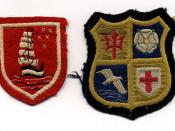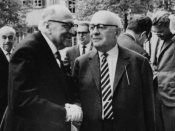To begin with, the Frankfurt School is not a place, but rather, a school of thought, emerging from the Institute of Social Research, which was established by a man named Felix Weil in 1923. Carl Grunberg was the first man to lead the Institute, and, inspired by the failure of the working class revolutions post World War One in the west of Europe, he introduced the idea of Marxism, which would later become the basis of the Frankfurt School. Marxism argues the use of hegemony in the media; the idea that one group controls another. The Frankfurt School claimed that the media was owned by wealthy, powerful people, who asserted dominance over the working class. Max Horkheimer took over from Grunberg in the year 1930, and he continued with Marxism, tightening the growing connection between science and social philosophy and producing some of the earliest conclusions that mass culture is important in the structure of society.
From 1933 to 1935, the Institute relocated to Geneva in Switzerland due to Nazi Germany, and by the end of 1935, it had moved to New York. In 1941 they relocated once more, this time to California, where they experienced the rise in popularity of film, music, radio, and television. By 1953, they had returned to the University of Frankfurt in Germany, and in 1955, Theodore Adorno took the position of co-director with Horkheimer.
The School's first wave of critical theorists produced several 'theories', such as the 'Critical Theory', which involved a critique of mass culture as suppression and integration into the 'norms of everyday life', and the 'Freudian Theory', which examined the repressive structure of modern day civilization and the causes of irrational social behavior. Horkheimer and Adorno produced 'The Dialect of Enlightenment' during this time, and Marcuse wrote, 'Reason and Revolution'. Both...


